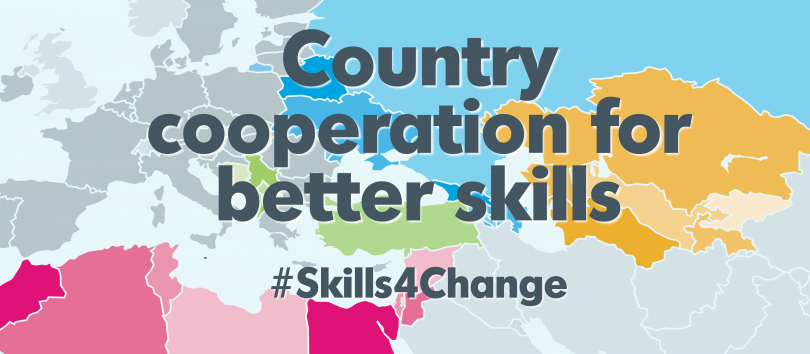
Country cooperation for better skills
Over its 27 years of activity, the ETF has cooperated with some 42 countries to modernise their education, training and employment systems to support economic development and social cohesion. While supporting the countries that joined the Union in 2004, 2007 and 2013 in their progress towards EU accession, the ETF’s geographic mandate was extended to embrace the neighbouring countries with which the European Union works to foster a shared space of stability and prosperity. This cooperation has helped the ETF over the years to accumulate knowledge and a deep understanding of the different contexts within which human capital development takes place.
The ETF now works with 29 countries in the Southern and Eastern Mediterranean1, the Western Balkans,2 Turkey, the Eastern Partnership,3 Russia and Central Asia.4 The European Commission has also asked the ETF to provide support to the EU-African Union in the area of skills.
‘In order to transform our dreams and aspirations into reality, we all need the opportunity to develop the right skills to access decent jobs. This is true for the young trainee as well as for the experienced worker in search of new employment options, and this is vital for stability and prosperity” says ETF Director, Cesare Onestini. “human capital development is central to the European Union’s assistance to countries around the world, starting with the ones in its neighbourhood. ETF was created 30 years ago to support this vital goal, this vision of societies where all can learn and train to achieve their full potential.” The ETF is the only one of 50 EU agencies that operates exclusively in the external policy field. With the Covid-19 post-pandemic recovery, and the drive towards greener and more digital economies and societies, skills development has taken on a renewed importance in the EU’s assistance efforts. “If people don’t have the right skills, the green and digital transition will not happen” says Onestini, “and there is a real risk that large sections of the population - perhaps even whole regions or whole countries - will get left behind.”
The European Training Foundation, based on its new 2027 strategy, works at two levels. On one side it cooperates with partner countries in designing and implementing reforms of their education, training and employment systems through policy advice, analysis and progress monitoring, networking and sharing experience and good practice. On the other, it supports the EU Delegations and Headquarters’ services in designing and implementing external assistance programmes and projects in the human capital development field. The ETF acts as a bridge between the reform strategies of the countries, and EU actions to support them.
“One of the ETF’s strengths is its ability to bring people round the table” says Georgios Zisimos, Head of the ETF’s Policy Advice Unit, responsible for coordinating the agency’s country work. “We’ve been working with partner countries for more than 20 years, so we have well-established networks with them, and of course we have close family ties with the European Union, which is the biggest provider of development assistance in the world, and long-standing cooperation with the other multilateral and bilateral donor organisations.” This relationship is based on trust and mutual interest to support human capital development.
Another important asset of the ETF is its neutrality with respect to national models. “There are no one-size-fits-all answers” says Zisimos. “It’s all about co-creating together with our partner countries.” In doing so, the ETF can draw on experience and practice from the partner countries themselves but also different EU Member States, as well as on its own knowledge and experience from 27 years of working with developing and transition countries.
The ETF’s strength is as a centre of expertise, a global knowledge hub, rather than as an assistance provider relying on big budgets. The ETF’s in-house expertise comprises a community of experts with in-depth knowledge of the partner countries. It acts as a broker, bringing together people and ideas to fill the gaps and move forward education and training reform for economic and social prosperity.
Today marks the beginning of the ETF’s new campaign on how we work together with our countries for better skills for all.
Did you like this article? If you would like to be notified when new content like this is published, subscribe to receive our email alerts.